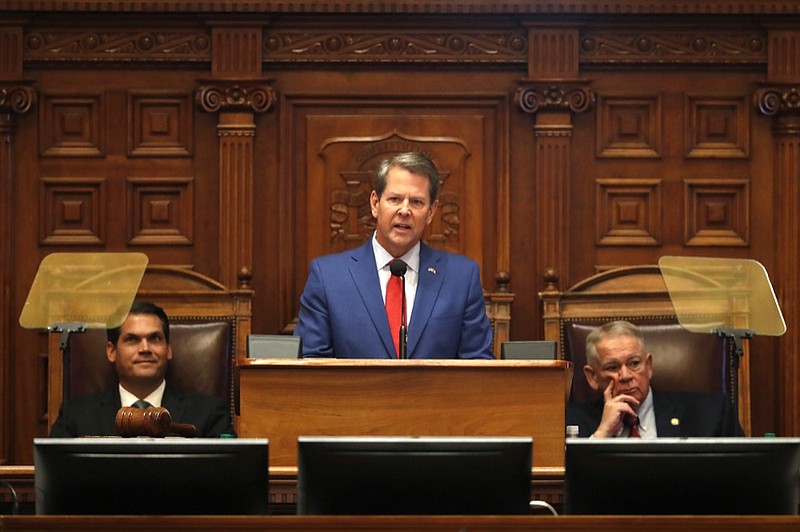ATLANTA (AP) - Georgia's 2020 legislative session opened Monday, bringing a flurry of activity back to the state Capitol. As lawmakers returned, they saw quick movement on legislation seeking to protect consumers from unexpected medical bills and tighten sales tax collection by online businesses. They also heard Gov. Brian Kemp outline his agenda in the annual State of the State address.
Here is a look at some of the action under the gold dome during the opening week:
STATE OF THE STATE
Kemp delivered his second annual State of the State address Thursday and forecast several of his legislative priorities for the year. Chief among them is delivering a pay raise of $2,000 for public school teachers at an estimated total cost of more than $380 million. It's part two of a campaign promise to raise teacher pay by $5,000, after Kemp was able to secure a $3,000 raise last year. Kemp also said he wants to make adoptions easier and reform medical billing practices. Kemp is proposing an increase to the adoption tax credit from $2,000 to $6,000 and lowering the minimum age for a person to adopt a child from 25 to 21.
Recently retired Republican U.S. Sen. Johnny Isakson attended the address and was recognized by Kemp as "one of Georgia's finest." Kemp announced the creation of a faculty position at the University of Georgia to research treatments for Parkinson's disease. Isakson's diagnosis with Parkinson's contributed to his decision to retire.
BREWING BUDGET BATTLE?
While Kemp favors the teacher pay raise, House Republican leaders have made it clear that they view cutting the state's top income tax rate for the second year in a row as a top priority. In a year where state revenue collections have fallen short of projections, it may not be possible to fully deliver on both.
A cut in Georgia's top income tax rate from 6% to 5.75% started in 2019, and another cut to 5.5% was planned for this year. That could cost the state government $550 million in the next budget if lawmakers make it retroactive to Jan. 1.
Republican House Speaker David Ralston of Blue Ridge said Thursday that he views delivering the tax cut as a "commitment" made to Georgia taxpayers. The proposed budget Kemp released Thursday doesn't include the second phase of the income tax cut.
UNEXPECTED MEDICAL BILLING
Another priority Kemp identified in his State of the State speech was implementing changes to protect consumers from what he called "surprise" medical billing.
"An out of network specialist, a procedure that wasn't approved or covered, nights in the hospital that didn't meet the requirements," Kemp said. "Families are living on a prayer because the system is rigged against them."
Lawmakers are working on the issue. GOP Sen. Chuck Hufstetler of Rome introduced a bill Tuesday that would provide some protections.
Hufstetler said Monday that a proposal dealing with the issue was passed by the Senate last year, but stalled in the House Insurance Committee. He said he thinks his latest bill will meet less resistance and "we can take care of it early in the session."
It is not yet clear whether doctors' associations and insurance companies are on board with the approach.
TAXES ON INTERNET SALES
Lawmakers struck a deal to tighten sales tax collection by online businesses including Amazon, eBay and Airbnb, after the effort got hung up last year over whether ride hailing services like Uber would be included. The House and Senate both approved a compromise version Thursday, sending it to Kemp's desk. The measure aims to collect sales taxes from third-party sellers that use online marketplaces to conduct business. The bill does not include an exemption for ride hailing services, but Hufstetler said lawmakers are likely to consider a separate bill setting a flat tax rate of 50 cents a ride later this session.
"The key with this is that we have a lot of internet sales in Georgia, we have other brick and mortar stores in Georgia, we're trying to put them on a level playing field," said Democrat and Senate Minority Leader Steve Henson, who was part of the House-Senate conference committee. The measure would take effect April 1, meaning it could bolster state revenue in the current budget year and possibly ease some budget concerns.
___
Associated Press writer Jeff Amy contributed to this report.
